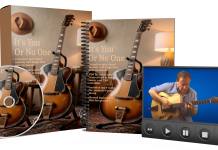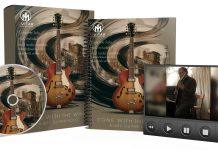This post may contain affiliate links. As an Amazon associate, Google associate as well as associate for other programs, Guitar & Music Institute may earn commissions from qualifying purchases.
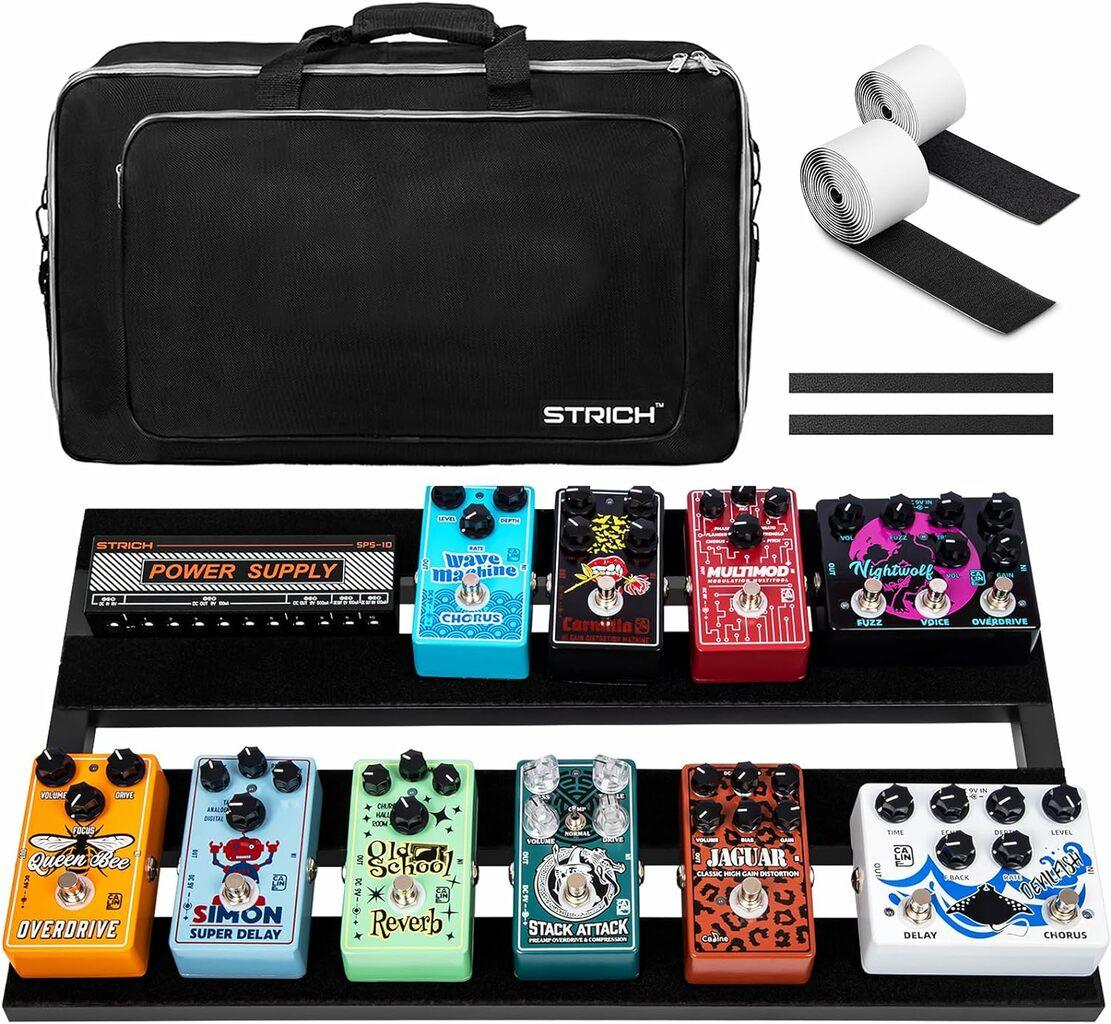
Are you tired of your guitar pedals cluttering up your practice space or stage? Looking for a way to keep them organized and easily accessible? Well, look no further! In this article, we will be diving into the world of guitar pedalboards and showcasing our pick of the bunch – the 8 best guitar pedalboards available on the market today.
Guitar pedalboards are essential for any guitarist who has a collection of effects pedals. These nifty devices not only help to keep your pedals organized, but also provide a clean and professional-looking setup. They allow you to easily switch between different pedals, create custom pedal configurations, and even provide power supply options for your pedals.
With so many options available, choosing the right guitar pedalboard can be a daunting task. That’s why we’ve done the research for you! We’ve scoured the market, tested various models, and narrowed down the choices to the top 8 pedalboards that excel in functionality, durability, and overall quality.
So, strap in and get ready to discover the best guitar pedalboards that will take your playing to new heights.
What is a guitar pedalboard?
Guitar pedal boards have become an essential component for guitarists looking to enhance their sound and experiment with different effects. Essentially, a guitar pedal board is a flat surface that holds multiple guitar pedals in place, allowing musicians to easily access and activate them during a performance or rehearsal. It acts as a central hub for all the pedals, providing convenience and organization.
These compact devices are designed to alter the sound of an electric guitar by manipulating various audio parameters. From distortion and overdrive to delay and reverb, the possibilities are endless. A guitar pedal board allows guitarists to mix and match different effects pedals to create their desired sound, whether it’s a distorted heavy metal tone or a clean and reverberating sound.
In addition to providing ease of access and organization, guitar pedal boards also help eliminate unnecessary cable clutter. By having all the pedals neatly arranged on a single platform, it becomes easier to connect them with minimal tangling and confusion. This ensures a smooth and hassle-free performance, as musicians can quickly switch between effects without any technical difficulties.
Why do you need a pedalboard?
First and foremost, a pedalboard is essential for keeping your guitar effects pedals organized and easily accessible. Imagine having a collection of pedals scattered all over the floor during a live performance or a jam session. Not only does it look chaotic, but it also becomes a logistical nightmare trying to activate the right effect at the right time. A pedalboard helps you avoid this mess by neatly arranging your pedals in a centralized unit.
Secondly, a pedalboard allows for efficient cable management. By routing your cables through the pedalboard, you can minimize the risk of tripping over loose wires and tangling them up. Additionally, pedalboards often come with built-in power supplies, eliminating the need for multiple power outlets or batteries for each individual pedal. This makes setup and teardown much quicker and more convenient.
Furthermore, a pedalboard enhances your tonal consistency. Plugging your guitar directly into different pedals, with varying signal strengths and tonal characteristics, can result in an inconsistent sound. With a pedalboard, you can easily control the order and routing of your effects, ensuring a harmonious and cohesive tone every time you play.
How do you power a guitar pedalboard?
When it comes to powering a guitar pedal board, there are a few different options to consider. One common approach is to use individual power supplies for each pedal. This method offers precise control over each pedal’s power requirements and eliminates the risk of noise interference caused by daisy-chaining multiple pedals together. While this approach can be effective, it can also lead to a clutter of cables and power adapters, making it somewhat impractical and cumbersome.
Another popular solution is to use a dedicated power supply unit designed specifically for guitar pedal boards. These compact units provide multiple outputs, allowing you to power several pedals simultaneously. They often feature isolated outputs, which prevent unwanted noise and signal interference. Additionally, some of these power supply units come with built-in voltage regulators, ensuring a consistent power supply, regardless of any fluctuations in the electrical outlet.
For those seeking a more portable and convenient option, rechargeable battery-powered pedal boards are available. These pedal boards feature built-in rechargeable batteries, eliminating the need for an external power source. This type of setup is particularly useful for performances in locations with limited access to power outlets or when playing outdoors.
Ultimately, how you choose to power your guitar pedal board will depend on your specific needs and preferences. Whether you opt for individual power supplies, a dedicated power supply unit, or a rechargeable battery-powered pedal board, the key is to ensure clean and consistent power to keep your pedals running smoothly and your creativity flowing. Experimenting with different power solutions can help you find the best way to power your guitar pedal board and unleash your musical potential.
Does your pedalboard need a case or gig bag?
Having a case or gig bag for your guitar pedal board can provide an extra layer of protection and make transportation easier. It can help prevent any damage that might occur during transit, whether you’re going to a local gig or traveling across the country. A sturdy case with foam padding will keep your pedals secure and reduce the risk of them being damaged by bumps or shocks.
Furthermore, a case or gig bag can also keep your pedalboard organized. With separate compartments and pockets, you can neatly store your pedals, cables, and power supply. This can save you time when setting up for gigs or rehearsals and ensure that you have everything you need in one place.
On the other hand, if you primarily use your guitar pedal board at home or in a studio, investing in a case or gig bag might not be necessary. However, it’s important to consider the potential risks of not having proper protection for your gear. Accidental spills, falls, or even pet interference can cause damage to your pedals and lead to costly repairs or replacements.
If you frequently gig or travel with your gear, it’s definitely worth investing in a sturdy case or gig bag to ensure the safety of your guitar pedal boards. However, if you mainly use your pedalboard at home or in controlled environments, you may be able to get away with storing it without extra protection.
DIY vs Pre-made: what’s the better option?
DIY pedal boards are an exciting option for those who enjoy building things themselves and want a customized setup. By making their own pedal board, musicians have the freedom to choose the size, layout, and materials that best suit their needs. Not only does this add a personal touch, but it also allows for a more efficient and organized setup.
On the other hand, pre-made guitar pedal boards offer convenience and simplicity. These ready-to-use options are perfect for musicians who may not have the time or expertise to build their own board. With pre-made boards, everything is pre-wired and ready to go, saving musicians valuable time and effort. Additionally, pre-made boards often come with features like built-in power supplies and cable management systems, which can further streamline the setup process.
However, it’s important to note that purchasing a pre-made board may limit the customization options. Musicians who have specific requirements or unique pedal combinations may find it challenging to find a pre-made board that perfectly suits their needs. DIY boards, on the other hand, offer endless possibilities for customization and can be tailored to accommodate any specific pedal arrangement.
How do you arrange pedals on a pedalboard?
How do you go about arranging them? The key is to consider functionality and signal flow. Generally, it is advisable to start with your tuner pedal first in the signal chain, followed by filters (such as wah-wah or envelope filters), compressors, overdrive/distortion pedals, modulation effects (like chorus or flanger), and end with time-based effects (such as delays or reverbs). This order ensures that your signal flows smoothly through the different effects, minimizing any unwanted noise or interference.
Consider the layout of your pedals on the pedalboard. If you have a particularly large collection of pedals, it may be beneficial to arrange them in parallel rows or in a semi-circle shape, allowing for easy access to each pedal. Organizing them in a logical manner ensures that you can stomp on the right pedal at the right time without any confusion.
Finally, it’s important to think about cable management. Utilize patch cables of appropriate lengths to connect your pedals, keeping them neat and avoiding any unnecessary tangling. Velcro strips or cable ties can be used to secure cables to the pedalboard, preventing them from getting pulled out or accidentally disconnected during performances.
Pedalboard signal chain order: how should you organize your effects?
One of the most crucial aspects is organizing the signal chain order of your effects. The order in which you connect your pedals can drastically impact your overall tone and how each effect interacts with the others. While there is no one-size-fits-all approach, there are some general guidelines that can help you make informed choices.
Typically, the signal chain starts with the guitar going into any tuner or wah pedals first. These pedals work best when they receive the pure, unfiltered guitar signal. From there, it’s common practice to place any compressors or boosters. These pedals help shape the dynamics and volume of your overall sound, acting as a foundation for the rest of your effects.
Next in line are the modulation pedals such as chorus, flanger, and phaser. These effects add depth and movement to your sound, and they work best when placed after the compressors and boosters. Following modulation pedals, time-based effects like delay and reverb are usually placed. These effects are responsible for creating spaciousness and ambience in your playing.
Remember, these recommendations are not set in stone, and experimenting with different pedal orders can lead to unique and exciting sounds. Probably the best way to organize your pedal board’s signal chain is to trust your ears and make changes based on what sounds good to you. So, don’t be afraid to try out different configurations and let your creativity guide you in creating a personalized sound.
Pedalboard cable management tips
One of the first tips for cable management on guitar pedal boards is to use high-quality patch cables. Cheap and low-quality cables can introduce noise and signal loss into your setup. Invest in good-quality cables that are shielded and have low capacitance to ensure clean and clear signal transmission.
Another important tip is to keep your cables as short as possible. Long cables not only take up unnecessary space on your pedalboard but can also introduce signal degradation. Opt for cables that are just long enough to connect your pedals without creating excessive slack.
Additionally, using cable ties or Velcro straps can help keep your cables neatly organized and prevent them from tangling. You can bundle your cables together and secure them at intervals to maintain a clean and professional-looking pedalboard.
Lastly, consider using a cable routing system or a pedalboard with built-in cable routing features. These systems can help guide your cables and keep them neatly tucked away. Some pedalboards even come with integrated cable channels and loops to further facilitate cable management.
In conclusion, proper cable management is essential for a well-functioning and visually appealing guitar pedal board setup. By using high-quality cables, keeping them short, utilizing cable ties or Velcro straps, and considering a cable routing system, you can ensure a clean and efficient pedalboard that enhances your playing experience. So put these tips into practice, and enjoy a clutter-free and smooth-sounding pedalboard.
Pedalboard essentials checklist
First and foremost, a sturdy and reliable pedalboard is crucial. There are various options available in the market, ranging from compact boards for minimal setups to larger ones for those who like to experiment with multiple effects. Look for a board that is durable, lightweight, and has enough space to accommodate your pedals comfortably.
Next, you’ll need a power supply to keep your pedals running smoothly. Investing in a high-quality power supply is essential to avoid any unwanted noise and ensure that all your pedals receive the correct amount of power. It’s a good idea to opt for a power supply with multiple outputs to accommodate different voltage requirements.
Now let’s get to the exciting part – the pedals themselves! The types of pedals you choose will depend on your musical style and personal preferences. However, a few essential pedals that every guitarist should consider include a tuner pedal for accurate tuning, a distortion/overdrive pedal for adding grit to your sound, a delay pedal for creating depth and space, and a modulation pedal such as chorus or phaser for adding character to your tone.
In addition to the pedalboard and pedals, don’t forget to include essential accessories like patch cables, Velcro or zip ties for securing pedals to the board, and a buffer pedal to maintain signal integrity. Investing in a good quality guitar case or bag to protect your setup during transportation is also advisable.
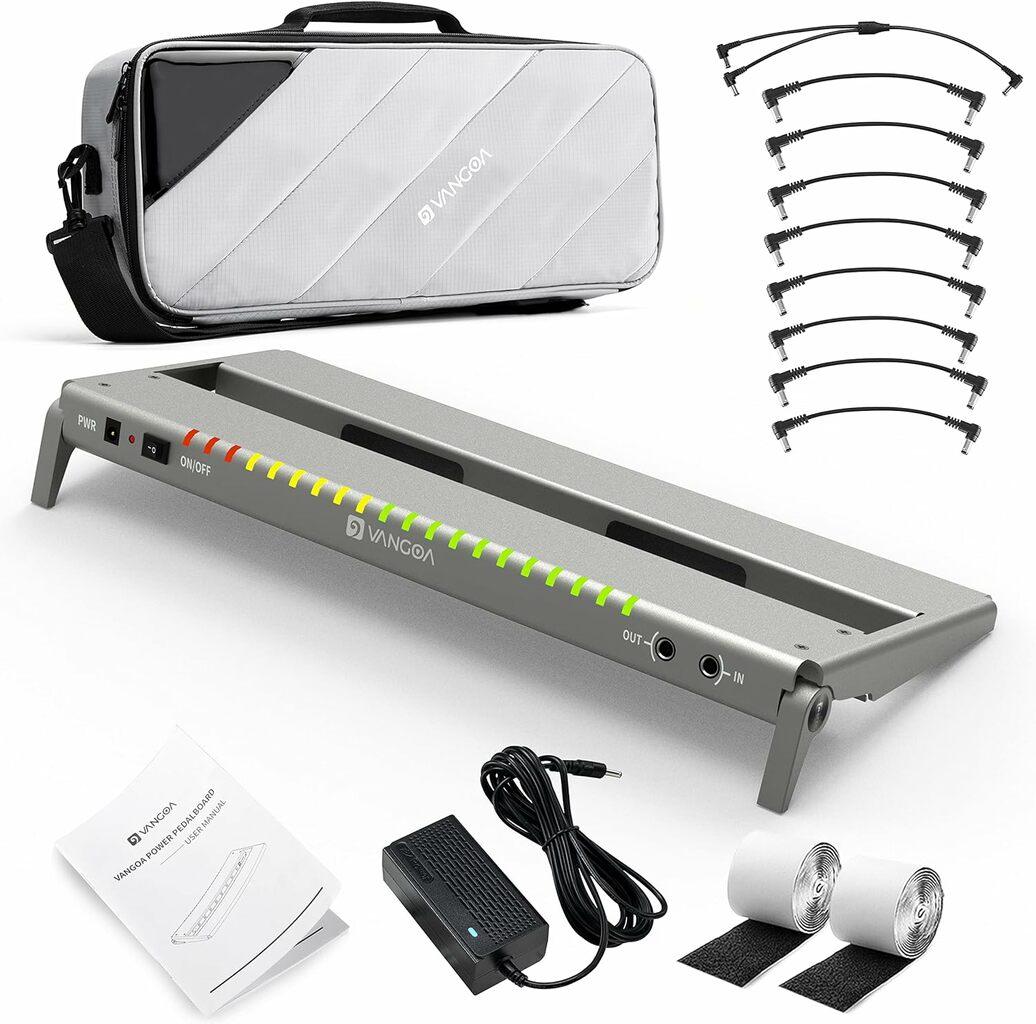
Vangoa Guitar Pedal Board
The Vangoa Guitar Pedal Board with Built-in Isolated Power Supply is a game-changer for any gigging guitarist. With its compact and lightweight design, this pedalboard is the perfect solution for musicians on the go. The built-in power supply eliminates the need for individual power adapters, making setup quick and hassle-free.
The VPPD-S Aluminum Small Portable Folding Powered Guitar Pedalboard features a sturdy aluminum construction that ensures durability while maintaining a sleek and professional look. It comes with a convenient carry bag, making transportation a breeze. At just 2.8 lbs, this pedalboard is easy to carry around without sacrificing functionality.
Overall, the Vangoa Guitar Pedal Board with Built-in Isolated Power Supply is a fantastic product for any guitarist looking to streamline their setup. Its efficient design, convenience, and portability make it a must-have for musicians of all skill levels.
Integrated power supply
Comes with a carrying bag
Foldable legs for angled or flat use
Built-in power supply isn’t as customizable as individual pedals
Power supply could be stronger
Size: 15.9 x 6.5 x 1.18 inches
Style: Small portable
Color: Gray
Power supply: 8 outputs
Advantage: Great noise reduction
Weight: 3.89 pounds
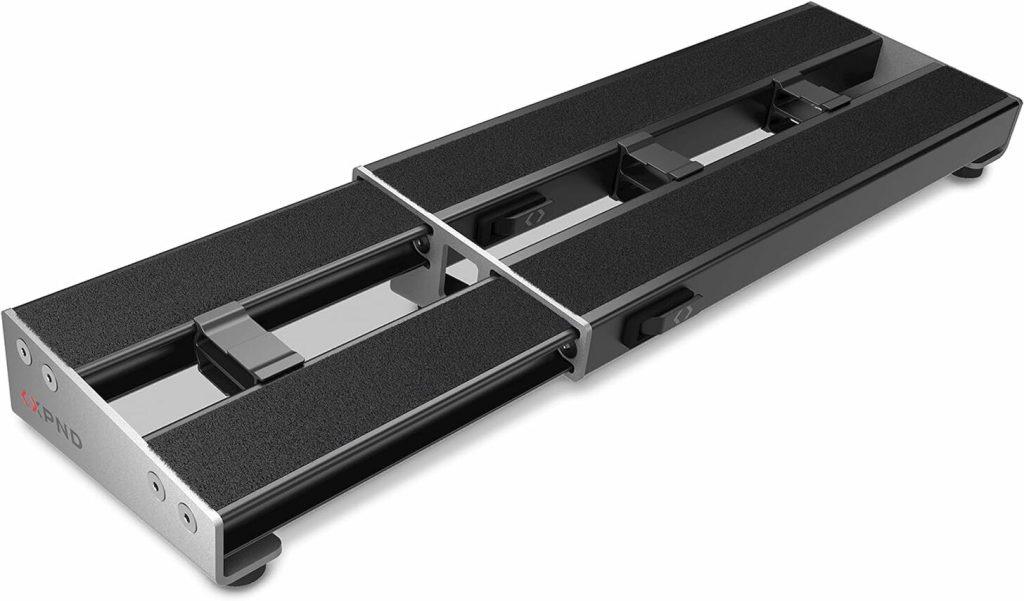
D’Addario Accessories XPND Pedal Board
The D’Addario Accessories XPND Pedal Board is a game-changer for guitar enthusiasts. This pedal board is a one-row expansion board that allows musicians to swap out their pedals quickly and effortlessly. Made from lightweight and durable aluminum, it is the perfect companion for any touring musician or home studio setup.
One of the standout features of this pedal board is the pre-applied loop velcro. This makes it incredibly easy to attach and swap pedals without any issues. In terms of design, the sleek and slim profile of the XPND Pedal Board is a great space-saver, allowing for a clean and organized set up.
Overall, the D’Addario Accessories XPND Pedal Board is a must-have for guitarists looking to streamline their pedal setup. Its expandable design, lightweight construction, and easy pedal swapping make it a top choice in the market. With the added benefit of the D’Addario Accessories brand, you can trust in the quality and reliability of this product.
Expandable length
Pedalboard expands from 14-24 inches
Telescoping design that allows for adjustments along the x-axis
Pre-applied loop velcro for quick-and-easy pedal addition
Setup might take longer than you expect
Pre-applied Velcro makes it difficult to position pedals exactly as you’d like
Color: Black
Design: Patented telescoping
Weight: 1 pounds
Material: Aluminum
Usage: Swapping Pedals
Size: 16″L x 5″W
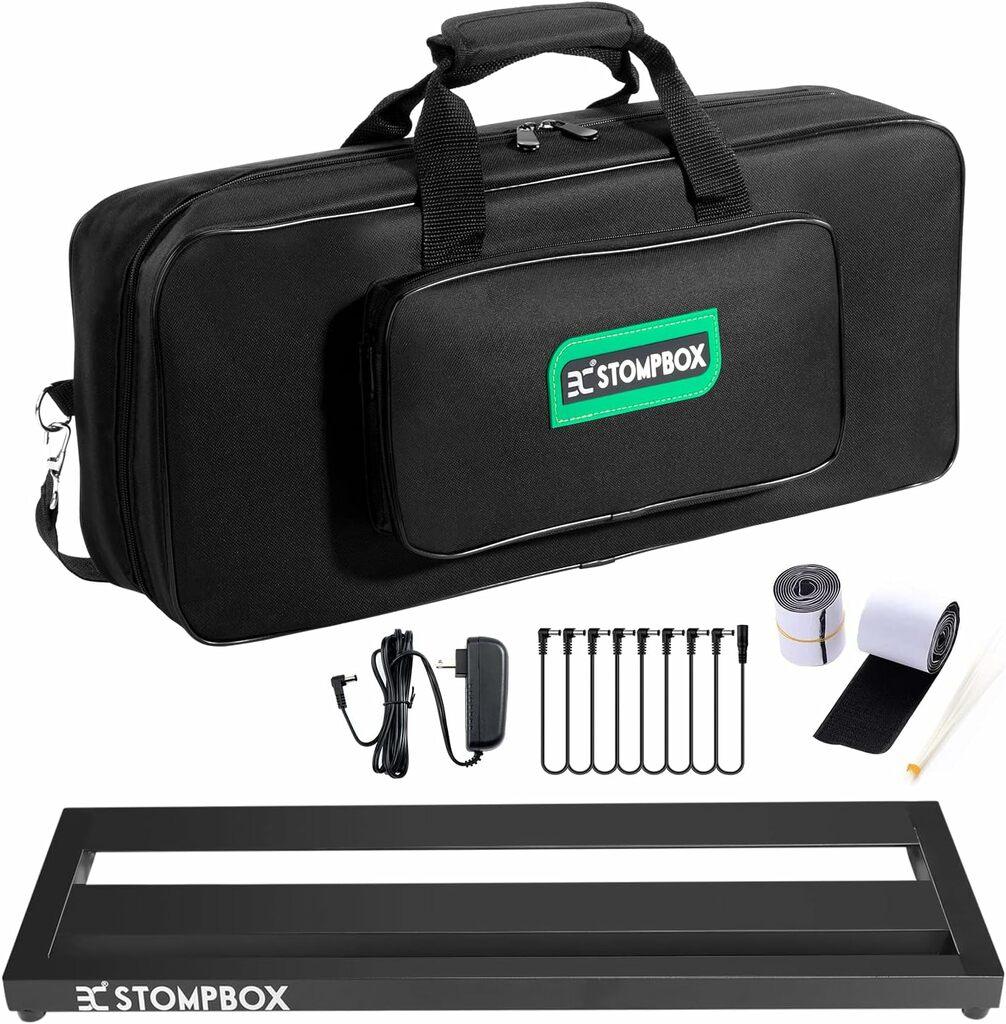
EX Portable 20″ Aluminum Pedalboard
The EX Portable 20″ Aluminum Guitar Effects Pedalboard is a must-have for any musician looking to organize their pedals and optimize their sound. This pedalboard not only provides a sturdy and durable platform for your pedals, but it also comes with a 9V 2A Guitar Pedal Power Supply and 8 Way Daisy Chain Cables, making it convenient and easy to power all your effects.
The lightweight and compact design of this pedalboard make it perfect for musicians on the go. It fits comfortably in the waterproof soft bag, providing extra protection and making transportation a breeze. The aluminum construction ensures that it can withstand the rigors of the road, while the sleek black finish adds a touch of elegance.
Overall, the EX Portable 20″ Aluminum Guitar Effects Pedalboard is a high-quality product that delivers on its promises. It is the perfect solution for organizing and powering your pedals, whether you’re playing live or in the studio. With its durability, convenience, and affordability, it is definitely worth considering for any guitarist or bassist.
Includes power supply, daisy chain
Comes with soft-sided carrying bag
Comes with power supply and cables
20″ size may not accommodate all of your pedals
Velcro doesn’t attach firmly to aluminum board
Weight: 4.49 pounds
Color: Pedalboard Combo
Power supply: 9V 2A
Type: Package
Size: 22 x 13 x 3 inches
Material: Aluminum
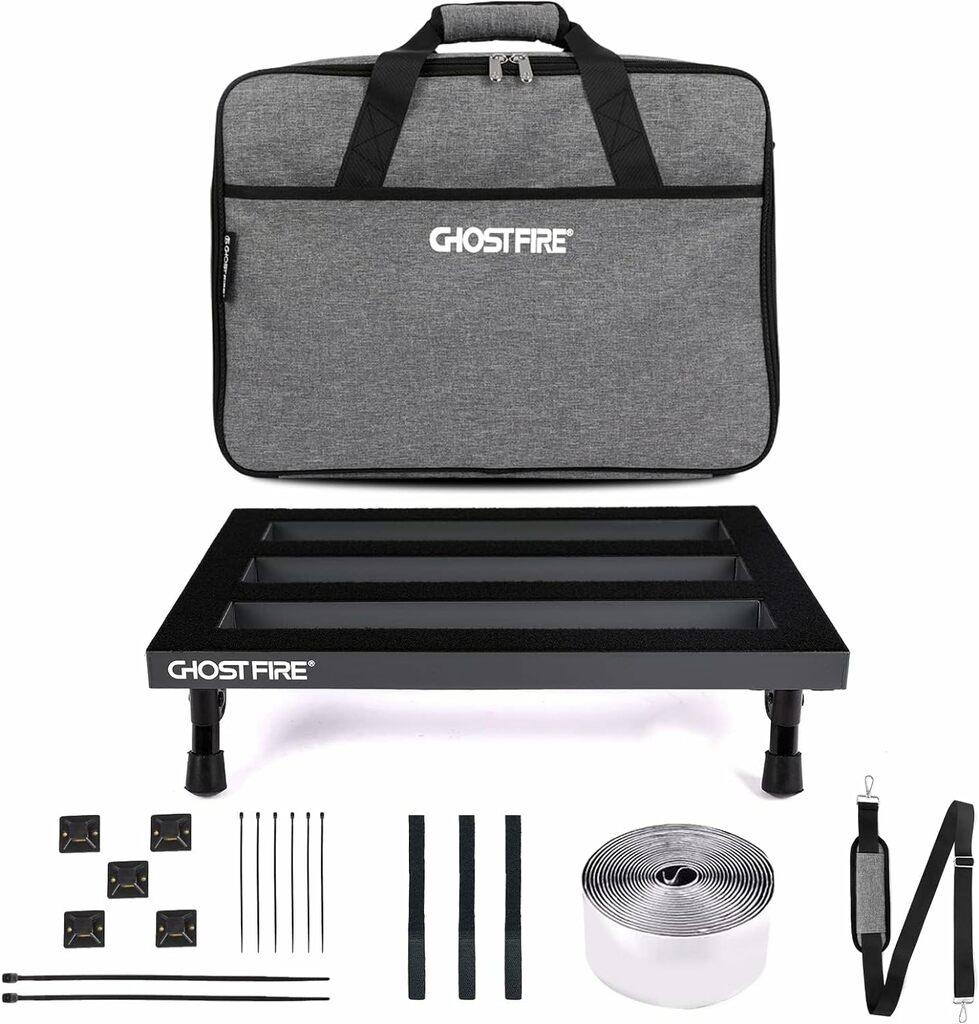
GHOSTFIRE Pedal Board SPL-03
The Ghost Fire Guitar Pedal Board is a fantastic addition to any musician’s collection. Made from durable aluminum alloy, this pedalboard is impressively lightweight at just 1.3lbs. Its dimensions of 16.5”x11.8” provide ample space for all your favorite effects pedals, allowing you to create your own unique sound.
The pedalboard also comes with a convenient carry bag, making transportation a breeze. The bag provides excellent protection for your pedals, ensuring they remain safe and secure during transit. Overall, the Ghost Fire Guitar Pedal Board is a stylish and practical choice for both professional musicians and hobbyists. Its affordable price point, durability, and lightweight design make it a must-have for any guitarist.
Comes with carrying bag
Huge pedal capacity
Lightweight and easy to carry
Noisy when you stomp on the foot stand
Limited to 10 pedals
Weight: 3.39 pounds
Material: Aluminum alloy
Size: 16.5”x11.8”
Bag: Carry
Design: ABS rounded corner
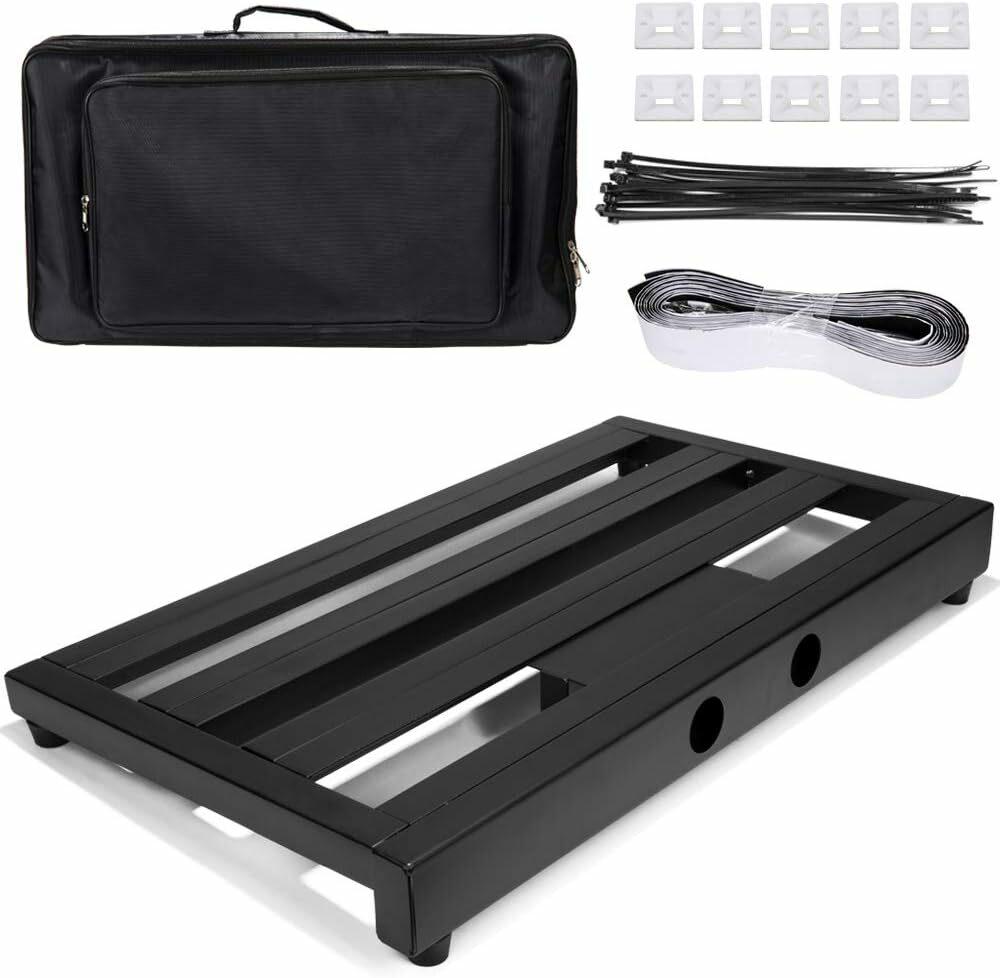
LUVAY Extra Large Pedal Board
The LUVAY Extra Large Guitar Pedal Board is a great addition to any musician’s gear collection. With its generous size of 22″ x 12.6″, it provides ample space to accommodate all types of pedals. The included bag is a convenient feature, making it easy to transport the pedal board from gig to gig.
Weighing only 7LB, this pedal board is lightweight and doesn’t add unnecessary weight to the musician’s load. The LUVAY brand ensures high-quality construction, making the pedal board durable and sturdy. Whether you’re a professional musician or just starting out, the LUVAY Extra Large Guitar Pedal Board is a reliable and practical choice for organizing and showcasing your pedals.
Extra large bag with shoulder strap included
Includes Velcro, and zip ties
Bag isn’t of great quality
Too big to fit on some smaller stages
Weight: 6.44 pounds
Unit: 1.0 Count
Brand: LUVAY
Usage: Outdoor, Indoor
Dimentions: 22″ x 12.6″ x 11.81 inches
Bag: Oxford carrying
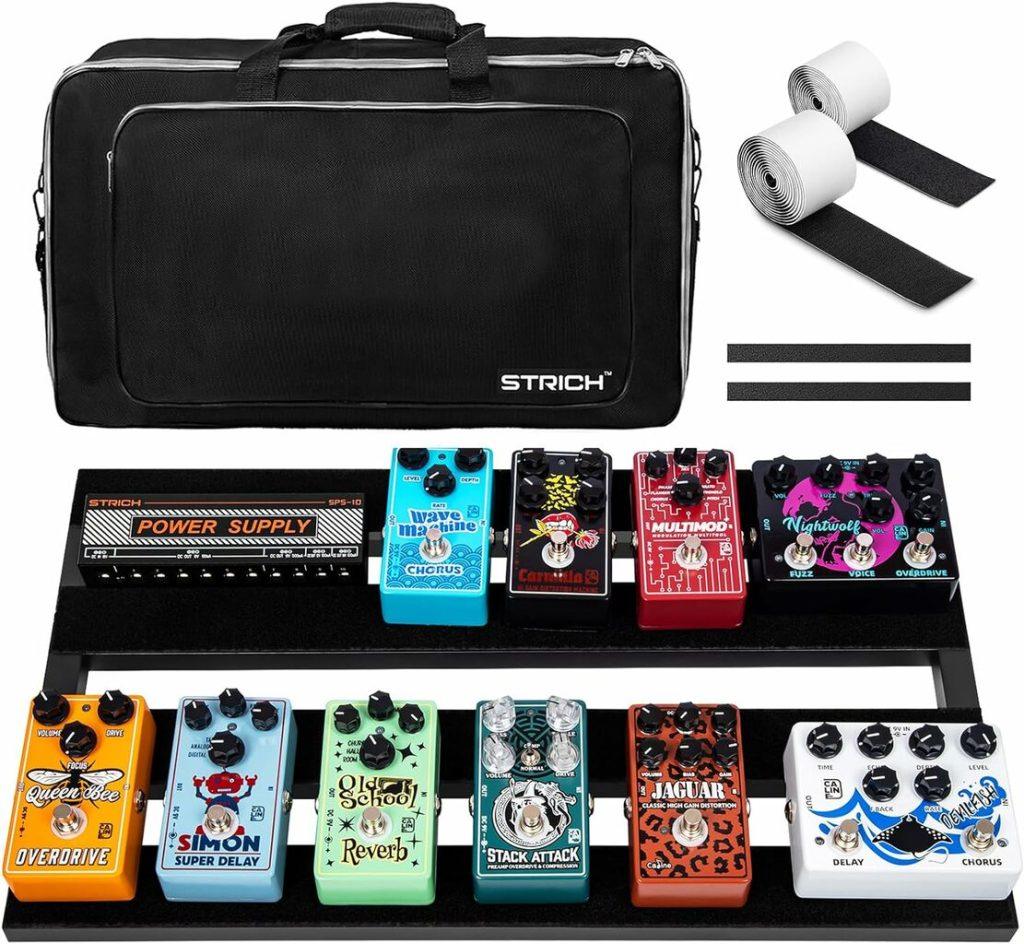
STRICH Aluminum Alloy Pedal Board
The STRICH Guitar Pedal Board proves to be an excellent choice for any guitarist looking to keep their effects pedals organized and protected. Constructed with high-quality aluminum alloy, this pedal board is not only lightweight but also durable. Measuring 22 inches by 12.5 inches, it provides ample space for a variety of pedals, and the angled design allows for easy accessibility.
The inclusion of a carry bag adds to the convenience of this product, allowing for easy transportation and storage. Whether you’re a professional musician or a hobbyist, the STRICH Guitar Pedal Board ensures that your pedals are secure and well-organized, allowing you to focus on your performance without any worries. With its blend of functionality and portability, this pedal board is certainly a great investment for any guitarist.
Comes with carrying bag and hook-and-loop tape for pedals
Adjustable feet for use on an uneven surface
Lightweight and portable
Plentiful cable management options
Power supply not included
Pedal space could be an issue if your effects collection grows
Material: Aluminum Alloy
Size: 22″ x 12.5″ x 3.15″
Weight: 4.69 pounds
Perfecr fit: 2.65lb Lightweight
Type: Guitar Pedal Board
Brand: STRICH
Style: Angled
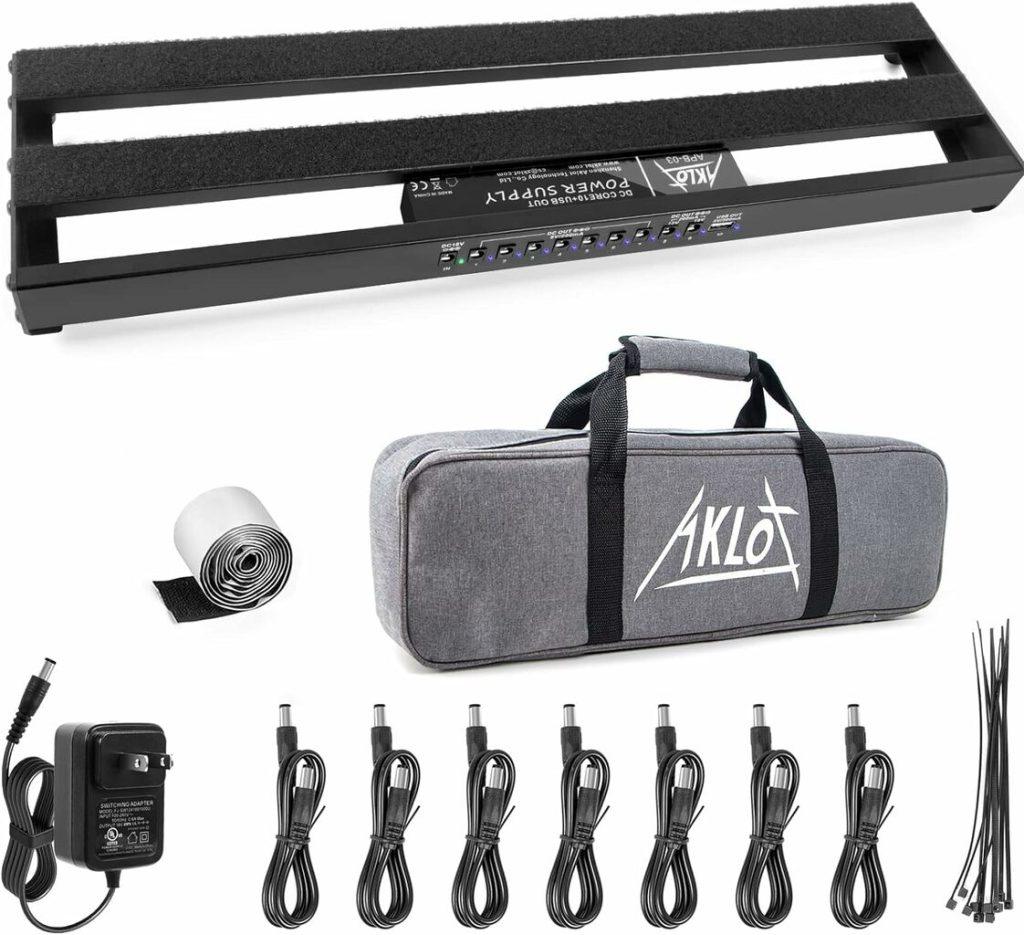
AKLOT Aluminium Alloy Power Supply Pedal Board
The AKLOT Guitar Pedal Board with Built-in Power Supply is a must-have for any guitarist looking to streamline their setup. Made from durable aluminium alloy, this pedal board provides a sturdy foundation for all your guitar effects pedals. The built-in power supply eliminates the need for extra cables and power strips, making it much easier to set up and tear down. The 19″ by 5″ size is perfect for housing multiple pedals, and the included bag ensures easy transport. The pedal cable and velcro attachments are also included, making it a complete package for organizing and securing your pedals. Overall, this AKLOT pedal board offers convenience, durability, and practicality, making it a great investment for any guitarist.
Built-in power supply saves the need for a separate power strip
Comes with a carrying bag, pedal cables, and Velcro
Built-in power supply has 9 outputs
Power supply can be noisy
Power supply might not be reliable
Weight: 3.43 pounds
Material: Aluminum
Number of interfaces: 10
USB: Yes
Usage stability: High
Color: Grey
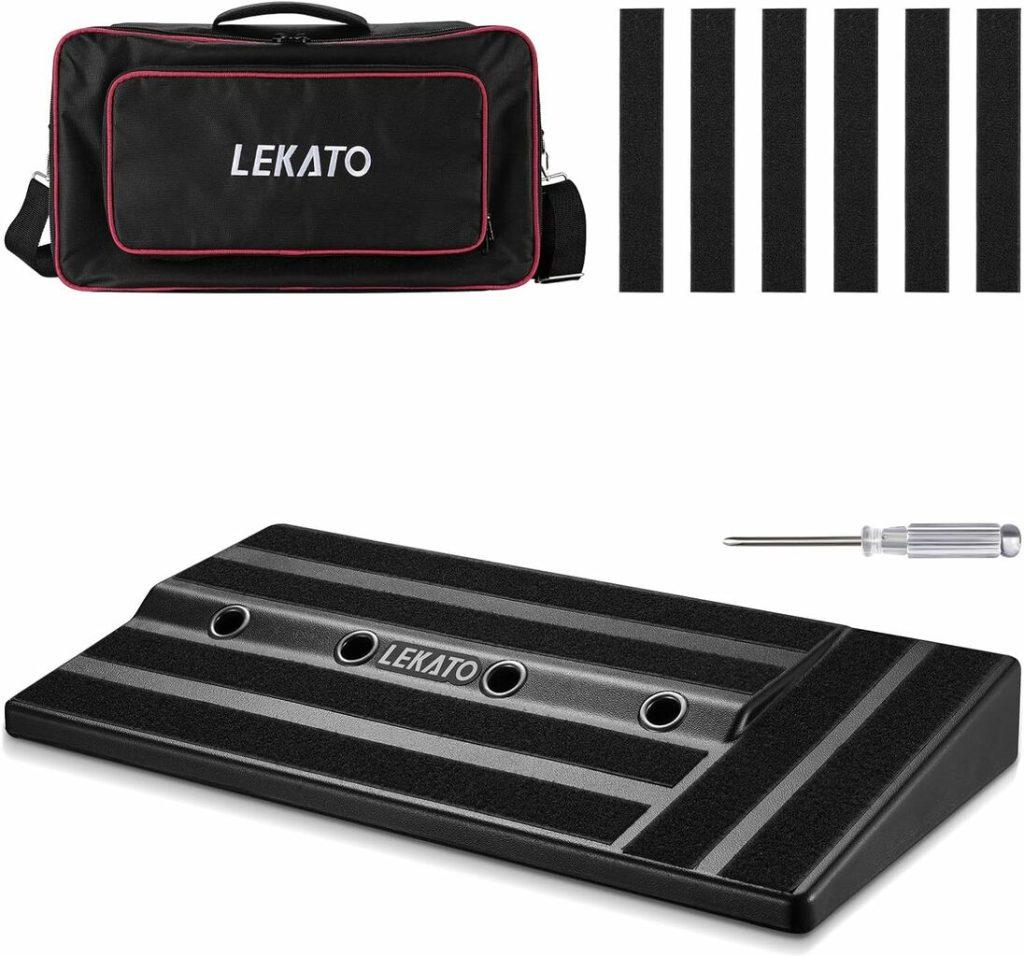
LEKATO BC Guitar Pedal Board
The BC Guitar Pedal Board from LEKATO is a fantastic product for any guitarist looking to organize their pedal collection. With its durable construction and ample space, this pedal board provides a great solution for keeping pedals protected and easily accessible.
The 20″x12″x2.4″ size of the pedal board offers enough room to fit multiple pedals, and the included compartment for a power supply keeps everything neatly organized. The board also comes with a carry bag, making it convenient for transport to gigs or rehearsals. Additionally, the mounting tape ensures that the pedals stay securely in place during performances.
Overall, the BC Guitar Pedal Board is a must-have for any guitarist who wants to ensure their pedals are well-organized and protected. With its great features and excellent quality, this product is definitely worth the investment.
Includes carrying case and mounting tape
Extra 5m dual lock
Accessory screwdriver included
Tilted design isn’t great for playing standing up
Power compartment may be too small for some power supplies
Weight: 4.94 pounds
Design: Slight slope
Volume: 19.7x10x2.36 inches
Body: ABS plastic
Package size: 21 x 12 x 5.5 inches
This post may contain affiliate links. As an Amazon associate, Google associate as well as associate for other programs, Guitar & Music Institute may earn commissions from qualifying purchases.



